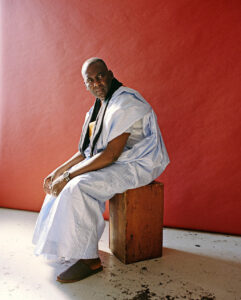Biram Dah Abeid
Credentials
Humanitarian Cause
Human Rights, Ending Human Trafficking, Community Sensitization on Human Rights and Civic Engagement, Human Rights Advocacy, Minorities’ Rights, Policy and Legislation Improvement, Modern Slavery, Emergency Response, Supporting communities in climate-vulnerable regions
Impact Location
Mauritania
Occupation
Politician / MP, Founder of the Initiative for the Resurgence of the Abolitionist Movement in Mauritania
Photo Gallery
About Biram Dah Abeid
Biram Dah Abeid is a prominent Mauritanian human rights activist, internationally recognized for his lifelong dedication to the fight against slavery. Born into a family of former slaves, Abeid’s own heritage has profoundly shaped his commitment to ending the practice of slavery in his country, where, despite being officially abolished in 1981, it still persists today. Abeid’s work through his organization, the Initiative for the Resurgence of the Abolitionist Movement (IRA), has been instrumental in raising awareness about this human rights crisis and advocating for real change.
Mauritania’s slavery problem is closely tied to its ethnic and social structures. The country is divided between the Arab-Berber elite, who have historically enslaved black Mauritanians, particularly the Haratin—descendants of enslaved people who continue to suffer from severe discrimination in Mauritania. Although slavery was officially outlawed, it remains deeply embedded in the society. Arab-Berbers are dominating political and economic power, while black Mauritanians and their descendants are often relegated to the margins. It is estimated that tens of thousands of people remain enslaved, many of them subjected to forced labor, sexual exploitation, and degrading living conditions.
The origins of Abeid’s activism can be traced back to his early years in the Haratin community. Officially freed, Haratin nevertheless remain an oppressed class in a rigid social hierarchy, often deprived of education, economic opportunities, and fundamental rights. Abeid’s parents were a stark reminder of the generational chains of servitude that defined his identity. He recalls making a promise to his father at the age of ten to dedicate his life to fighting slavery. This personal vow would later drive his academic pursuits and activism, despite the numerous challenges he faced along the way.
“I was born a pariah involuntarily. Society refuses to grant us any consideration or any hope, and this is why I have revolted. I am subject to ostracism, and I am fighting against this.”
After completing his education, including a master’s degree in history, Abeid joined the Mauritanian NGO SOS Esclaves, which provided him a platform to work as a researcher and advocate for enslaved communities. His research illuminated the harsh realities of slavery that still existed in Mauritania, where many Haratin people are forced to work in subhuman conditions for no pay, and their children are often subjected to the same fate. This drove Abeid to launch the Initiative for the Resurgence of the Abolitionist Movement (IRA) in 2008, an organization committed to eradicating the vestiges of slavery and dismantling the systems of impunity that enable its persistence.
Abeid’s approach to activism has been characterized by his bold and uncompromising tactics, like using mass protests, public demonstrations, and sit-ins, which set him apart from other abolition groups. One of his most controversial actions came in 2012, when he publicly burned texts that were being used to justify the enslavement of black Mauritanians through religious interpretations. This act of defiance led to his arrest on charges of blasphemy, with some government officials calling for his execution. However, thanks to international pressure, Abeid was released after four months in prison.
Over the years, Abeid has been jailed numerous times for his activism, often accused of inciting unrest or belonging to an illegal organization, as the Mauritanian government has refused to officially recognize the IRA or let it register as an NGO. His arrests did not deter him.
“I have regularly inhabited the ruthless prisons of my country and have suffered from persecution. I represent the group called the Haratim, subservient people whose rights have been usurped, abusively. And this is due to a very conservative reading and ancestral reading of Islamic law.”
Abeid and the IRA have played a crucial role in exposing the scale of modern slavery in Mauritania. Their efforts have garnered international recognition, with Abeid receiving numerous awards, including the United Nations Prize in the Field of Human Rights in 2013 and the Front Line Defenders Award for Human Rights Defenders at Risk. He was also named one of Time magazine’s 100 most influential people.
The IRA’s work has extended beyond Mauritania’s borders, with divisions established in countries like Belgium, the United States, and Germany. Abeid has tirelessly advocated for international pressure on the Mauritanian government to enforce its anti-slavery laws and has sought to build a global coalition against slavery. His activism highlights the need for both internal reform and external accountability to address the root causes of slavery, which include not only legal loopholes but also entrenched cultural attitudes.
In addition to his work as an activist, Abeid has also entered the political arena. He ran for president of Mauritania in 2014, finishing second, although he questioned the fairness of the election process. Undeterred, he ran again in 2019, campaigning on a platform of equality, justice, and the rule of law. Although he did not win, his candidacy was significant, as it symbolized the growing recognition of the Haratin community’s political and social aspirations.
Biram Dah Abeid’s legacy as the “Nelson Mandela of Mauritania” is a testament to his courage and persistence. Despite facing imprisonment, physical attacks, and governmental opposition, Abeid continues to lead the fight against slavery. His unwavering commitment to justice and equality has inspired thousands of activists in Mauritania and beyond, and his work shines the light on the plight of those still trapped in servitude.
As Mauritania continues to grapple with its history of slavery, Abeid’s advocacy is crucial in pushing the country towards true abolition. His vision extends beyond the mere legal end of slavery; he seeks to dismantle the systems of oppression that keep people in chains, whether physical or societal. Through education, international collaboration, and persistent activism, Biram Dah Abeid is transforming the fight against slavery in Mauritania into a global movement for human dignity.



